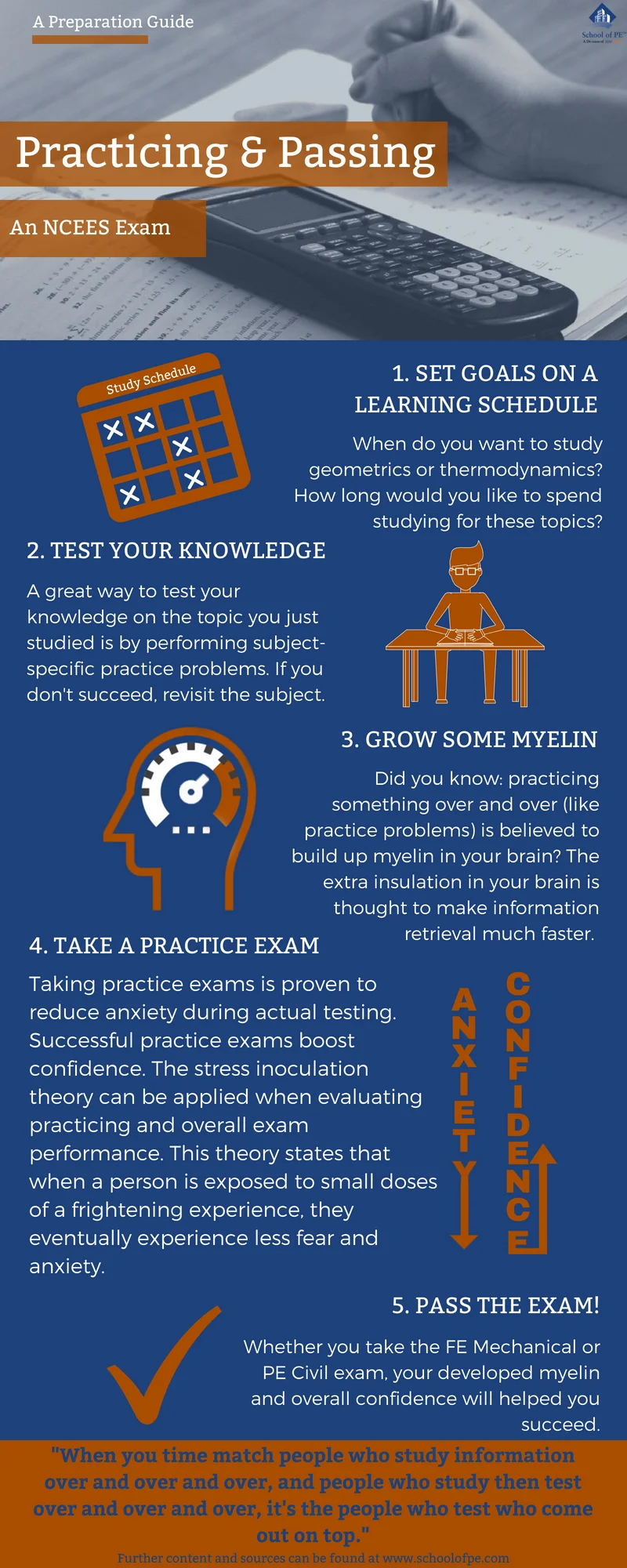Everyone knows the saying, "practice makes perfect." From practicing difficult engineering math equations to formulating strategic moves in chess, practice is scientifically proven to be an important factor for success. The act of practicing something seems simple enough, but psychology proves that there is a lot of science behind practicing. Why is practicing effective? And why should you do it? For engineers, why are FE practice exams or PE exam sample questions vital in preparing for NCEES exams? Practicing has been found to be one of the most effective techniques for studying as it improves cognitive functionality and reduces overall exam anxiety.
Many studies have shown that periodically practicing after studying a specific subject is an effective exam preparation technique. After studying a subject or topic, a great way to test the obtained knowledge is by taking subject-based practice tests. If one struggles with the questions pertaining to the just-reviewed topic, the topic should be revisited until the concept is fully grasped.

"When you time match people who study information over and over and over, and people who study and then test over and over and over, it's the people who test who come out on top. It's not a matter of how much or how long you study, it's a matter of how you study," Amanda Smith, a psychology graduate student at Tufts University, reported in an informational video about learning habits.i
Repetitively repeating something actually alters the physical composition of your brain, according to performance coaches and TED-Ed speakers, Annie Bosler and Don Greene. Practicing something generates a build-up of myelin around the axons of the brain, which improves insulation. It is believed by scientists that the extra insulation increases the functionality of the axons, which makes the electrical signals in your brain move faster and recall information at a more rapid pace.ii
When evaluating practicing effects in accordance to academics and exam taking, practicing reduces anxiety and stress: two feelings that could be detrimental to exam scores. Practicing decreases anxiety both in the learning process and in the actual exam-taking process. Research has shown that anxiety has detrimental effects when it comes to taking exams. When experiencing anxiety, examinees typically have issues retrieving information.iii The reduction of anxiety co-aligns with the idea of self-efficacy; the more one practices, the more information he or she would retain. When individuals see themselves improving, their confidence will rise, and their anxiety will decrease. Stress inoculation theory can also be applied when evaluating practicing problems and exam performance. The theory states that when a person is exposed to small doses of a frightening experience, they eventually experience less fear and anxiety.
For those who are preparing for an FE or PE NCEES exam, practice problems are a great way to increase overall learning initiatives. School of PE has recently launched a new Question Bank for FE review courses and is planning to expand the Question Bank to PE review courses soon. The Question Bank features a bank of practice problems for students to test their knowledge. The practice problems closely mimic NCEES' computer-based test experience. At this time, School of PE students who enroll in our FE Chemical, FE Civil, FE Electrical, FE Environmental, FE Industrial and Systems, FE Mechanical, and FE Other exam review courses are provided the Question Bank for free. Sign up for an exam review course and start practicing today!
Prepare, Practice, Pass
Anytime, Anywhere
It's that easy!
References:
i Thomas, A., & Smith, A. (Researchers). Practice makes perfect: Learning by taking practice tests protects memory against stress [Video file]. Retrieved from https://www.youtube.com/watch?v=pDIqEui5mpQ
ii Bosler, A., & Greene, D. (Educators). How to Practice Effectively [Video File]. Retrieved from
iii Nelson, J. M., & Harwood, H. (2011). Learning disabilities and anxiety: A meta-analysis. Journal of Learning Disabilities, 44(1), 3-17. doi:10.1177/0022219409359939
No comments :
Post a Comment